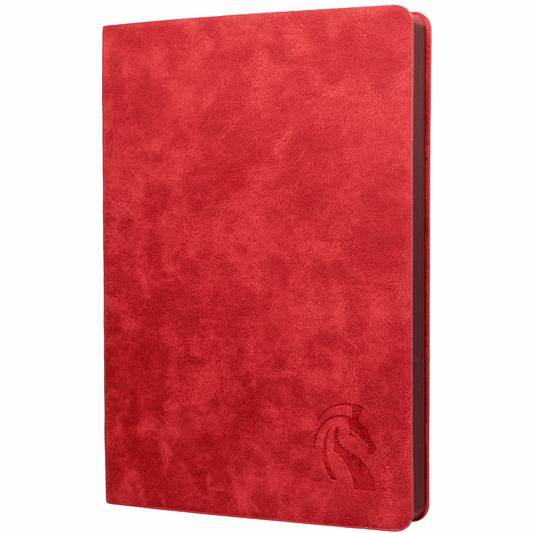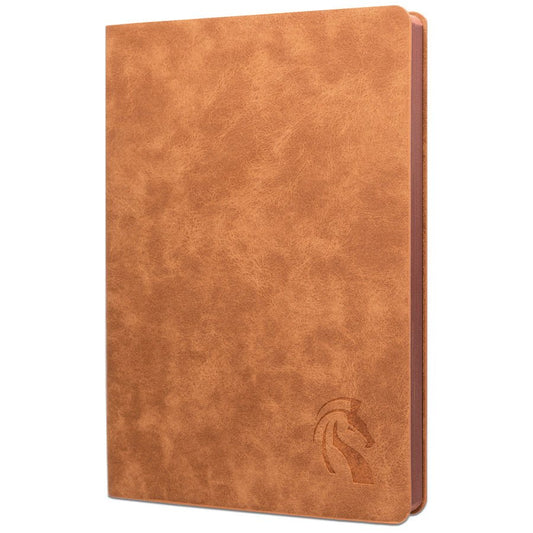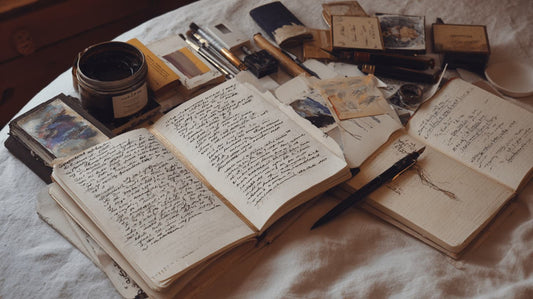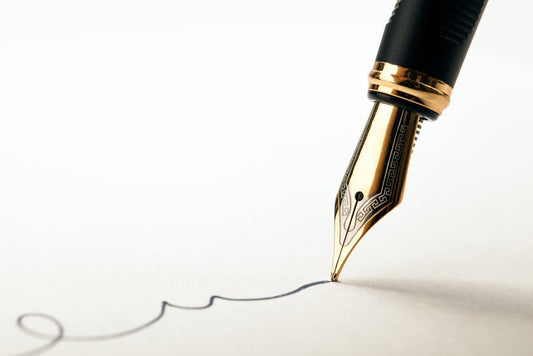
Self-care, including attention to one's emotional, physical, and spiritual well-being, is more important than ever in today's world.
Maintaining a journal is a wonderful practice and a wonderful kind of self-care that can be incorporated into your daily life (or weekly, it is completely up to you). However, you might be wondering, "What is journaling, and why should I attempt it?" Worry not; we'll help you make the most of your journaling efforts by giving you some guidelines and information.
What's the purpose of your journal?
Did you know that there is a distinction between something called a diary and something called a journal? Although this may seem like a distinction without a difference to some people, the very definition of a diary is that it is a method of recording events as they occur.
On the other hand, a journal is a little bit more personal and actually has no boundaries when it comes to the form that it can take. A journal is nothing more than a book, notepad, or digital platform that serves as a place to jot down one's thoughts and aspirations.
What Are the Benefits of Journaling for Men?
Even though many men may scoff at the idea of maintaining a journal, many of the most brilliant thinkers throughout history have kept journals. Some examples are Leonardo da Vinci, Albert Einstein, Nikola Tesla, and Ernest Hemingway. Not to mention the multiple benefits of journaling are well proven; this is another advantage of keeping a notebook.

Keeping a journal is beneficial for many reasons, but one of the most important ones is that it can help you stay accountable. Putting your objectives and desires down on paper is a good way to monitor your development (or lack thereof). Imagine being able to read back on past diary entries about previous objectives and being able to celebrate how far you've come and what goals you've been able to cross off your list.
This would be a really satisfying experience. Keeping a journal on a regular basis has a number of advantages, including the following, in addition to the accountability it provides:
- Reduces stress and increases your chances of living forever
- Makes it possible to engage in contemplation and reflection
- Enhances your mood, helps you remember things better, and reduces the symptoms of anxiety and despair.
Choosing A Journal You Like
If you want to make keeping a diary a regular habit of yours, the first thing you should do is determine where you want to keep your ideas and write them down. Journaling takes on a very different appearance in this so-called "Digital Age," as opposed to what it once was. And this is the true beauty of journaling: you can tailor it to fit your day-to-day life and the specific requirements you have for it.
There are some men who find it simpler to scribble down their ideas with a pen and paper, but the possibilities are endless for you (and can even include a combination of mediums). If you prefer a digital media. If keeping a traditional paper diary isn't your thing, digital alternatives such as Evernote, Notepad, WordPress, and word processors are excellent places to begin.

On the other hand, let's say you want to keep a notebook the old-fashioned way, with a pen and paper. In addition to the abundance of digital mediums available for organizing your ideas, here are a few different sorts of journaling methods that you might want to take into consideration:
Journaling in the Manner of a Scrapbook If you're the kind of person who just can't bring themselves to get rid of things like concert flyers, matchbooks, and ticket stubs, then a journal written in the style of a scrapbook is definitely the most suitable format for you.
Morning Pages is a method that is more flexible than the bullet journaling approach. Sitting down with a pen and notebook, starting to write, and continuing to write until you have filled up three pages is all that is required to complete the exercise. The purpose of this exercise is to help you wean yourself off of the temptation to self-edit, which frequently stands in the way of genuine self-expression.
One-Sentence Journaling: The one-sentence journal is ideal for the busy individual who lacks the time to write in a full-length journal (or just has a hard time maintaining a routine). This structure is about as straightforward as it gets; all you need to do is jot down one line that summarizes whatever stood out to you as particularly significant about your day.
The option known as "Bullet Journaling," which was developed by a digital product designer by the name of Ryder Carroll, is ideal for the goal-oriented individual who wishes to arrange a mind full of ideas into tangible results.

Go at Your Own Pace.
Because of our incredibly short attention spans, it can be difficult to create new habits, which is something that we are all well aware of (especially in the era of social media). Because of this, it is essential to take things slowly at first and set up a specific amount of time each day to write in your notebook.
Start off slowly if you are unsure of your ability to maintain a consistent journaling routine. The goal is to gradually incorporate it into your everyday routine by giving yourself small increments of time, such as five minutes here and seven minutes there.
It makes no difference where or how you initiate things. You could even just write one sentence or one page if you wanted to. The development of this habit is what has to be prioritized.
Try writing in your diary at different times of the day if you find that you have problems sticking to a consistent journaling routine. You might even want to give writing in a different setting a shot.
Changing up your environment can invigorate your senses, stimulate your creativity, and provide you with new sources of inspiration. Try writing in a fresh setting, whether you choose to do it in front of a coffee shop, at a dog park, or even on your own balcony, to break the monotony of your typical writing routine.
Develop It a New Habit

Try using the 21/90 approach if you find that it is difficult to form new, positive habits. It's not that complicated: If you give yourself 21 consecutive days to work toward a goal, you will have effectively developed a new routine by the end of the three weeks.
Congratulations! But don't stop there; if you maintain this new routine for another three months, it will get ingrained in your lifestyle and become second nature to you. As was noted earlier, keeping a diary is associated with a wide variety of positive outcomes; so, if you are wanting to develop a new positive routine, you might want to consider making journaling your new routine
Are You Stuck for Things to Write About?
Journal Rough Thoughts onto Scrapbooks
There are a couple of things you can do to help get those creative juices flowing, whether you are just getting into the swing of journaling or if you are experiencing writer's block. If you are just getting into the swing of journaling, there are some things you can do to help get those creative juices flowing.
Write about gratitude. It is believed that showing thankfulness can enhance the quality of your sleep, lower levels of stress hormones, and even add years to your life. Taking the time to express gratitude can have a multitude of positive effects.
If you are having trouble thinking of a subject to write about, you could just use this opportunity to reflect on the things for which you are grateful. It has been claimed that successful people have one thing in common, and that is that they express thanks on a daily basis. This is just some food for thought.
Try using a daily prompt in addition to voicing your appreciation for the things in your life. You'll find that many journals already have prompts written in them, but if you need more, you can always look for them online. You will never have to worry about writer's block again if you have this.
Dedicate a small amount of Time each day
Establishing brand-new habits isn't always easy, which is why we suggest using a timer whenever possible. The incorporation of a timer not only fosters greater self-control and awareness, but also, and perhaps more crucially, it establishes a resolute purpose. Your goal throughout the specified period is crystal clear: you want to put down your thoughts for a certain number of minutes.
Concentration and focus are byproducts of having an intention. A helpful strategy for making things more manageable is to zero in on one very specific activity at a time for a predetermined amount of time.

Write down some dot points to start.
Just start writing and let your thoughts flow freely without censoring yourself; this one is relatively easy to understand. When you have a lot of thoughts going through your head, often at the same time, writing in a stream of consciousness is an excellent method to get them all out of your head at once. However, why should you make use of a writing style known as stream of consciousness?
Consider the following: Do you ever find yourself feeling overwhelmed by the problems, thoughts, and tasks that are always going through your mind throughout the day? Some people experience it first thing in the morning, while others get these thoughts immediately before going to bed, and both times, it may be very overwhelming.
The author's train of thought Writing entails merely putting down on paper whatever ideas come to mind. There are no hard and fast guidelines to follow here; simply put pen to paper and jot down any and all of the thoughts that come into your head. It is important to remember not to rush the procedure.
This method of writing has a tendency to unearth a lot of thoughts that have been buried deep inside your subconscious and bring them to the surface. Not only is this restorative for you, but it also helps you obtain insights into things you may not have even known you needed.
Check Out LeStallion's Best Journal For Men
LeStallion Journal For Men
LeStallion Soft Cover PU Leather Journals inspires and excites you to write more, allow you to further grow and develop, so you may achieve your goals and dreams!
SHOP LESTALLION













